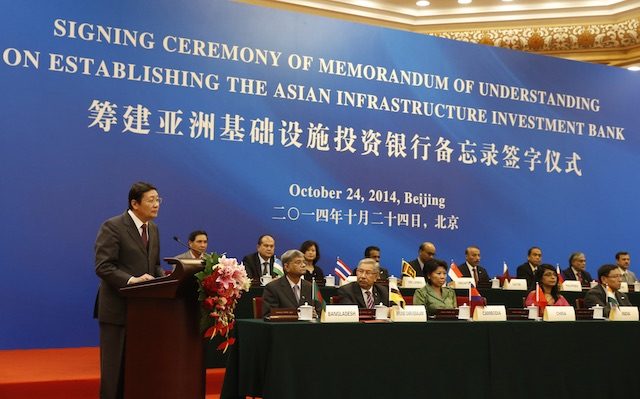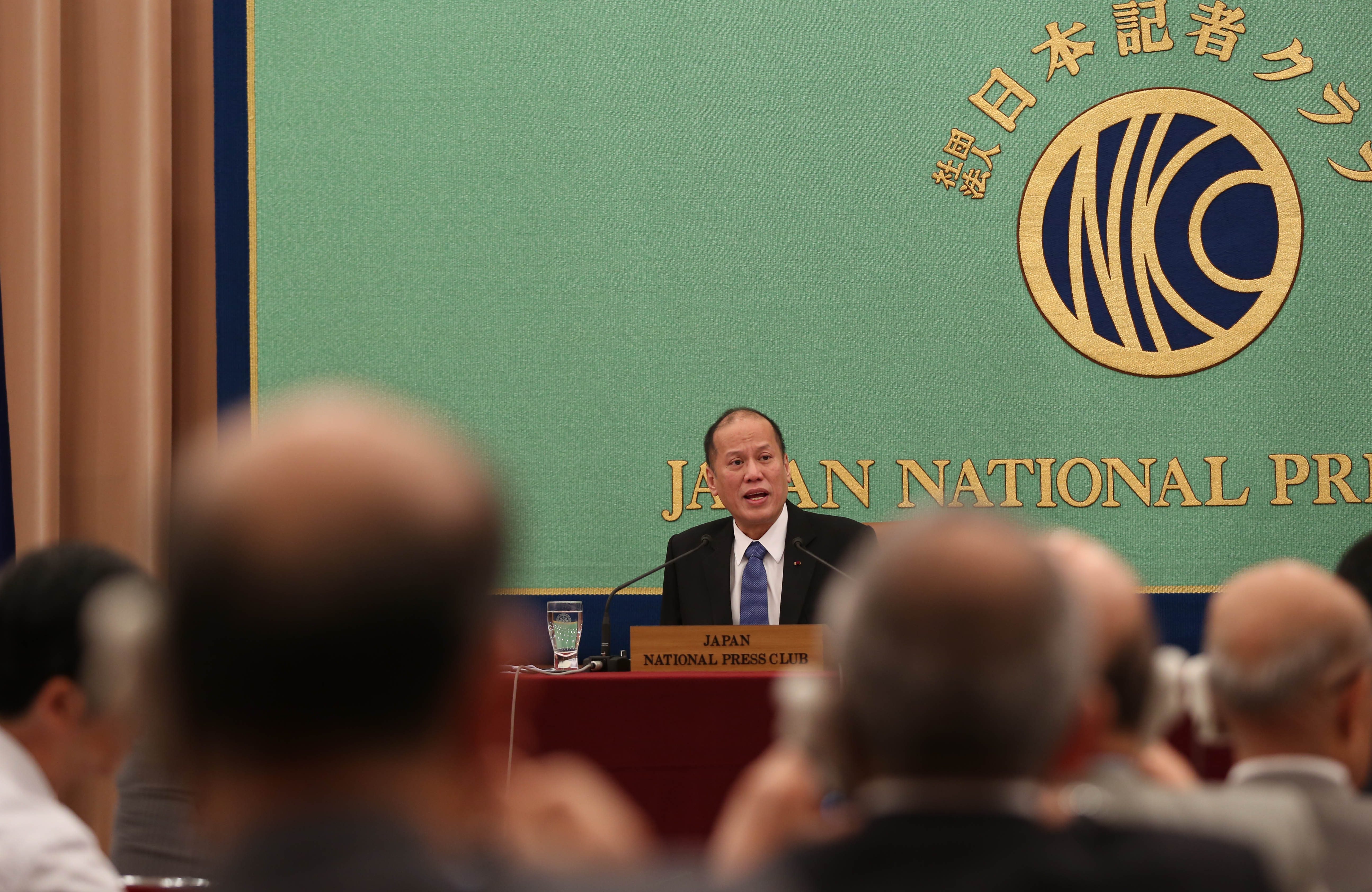SUMMARY
This is AI generated summarization, which may have errors. For context, always refer to the full article.

MANILA, Philippines (UPDATED) – The Philippines on Wednesday, December 30, said it is set to join a China-led bank seen to rival the World Bank (WB) and the Asian Development Bank (ADB).
This comes as the Philippines and China remain locked in a dispute over the South China Sea.
In a statement, the Philippines said it will sign the Articles of Agreement of the Asian Infrastructure Investment Bank (AIIB) before the end of 2015. This means the country is officially joining the AIIB.
The AIIB aims to finance infrastructure development in Asia but critics have expressed concern about its standards.
The Philippines, however, said it is joining the AIIB because it believes that the AIIB “will augment and complement existing multilateral institutions” in boosting the economy.
“Our shared pursuit of growth and development has only become more challenging as the global environment becomes increasingly complex. We thus welcome platforms where countries can work towards shared development goals in the spirit of partnership,” Philippine Finance Secretary Cesar Purisima said in a statement.
He continued: “In a globalized world, connectivity is the name of the game. AIIB is a promising institution addressing investment needs, and will help close financing gaps in many countries. I also see this as a chance for greater collaboration with member countries, especially with ASEAN, on regional infrastructure goals.”
Joining the China-led AIIB eventually means more jobs and better businesses, Purisima added.
He explained that “as the AIIB has no restriction on the procurement of goods and services from any country, we may foresee market expansion for infrastructure-related industries, widening job and business growth opportunities.”
Political tensions factored in
The Philippines initially hesitated to join the AIIB, which was formally established on December 25 with 57 member countries.
The Southeast Asian country had several reasons for this. (READ: Why the Philippines is not yet joining China led Infra Bank)
First, the Philippines had controversial infrastructure projects with China in the past.
Philippine President Benigno Aquino III once cited the China-funded Northrail project. The project was approved under his predecessor, detained former president Gloria Macapagal Arroyo. Eventually, the Aquino administration scrapped it due to corruption allegations as well as lingering legal issues.
In hesitating to join the AIIB at first, the Philippines also mentioned political tensions. These tensions mainly involve the dispute over the South China Sea, the subject of an ongoing case filed by Manila against Beijing.
In June, Aquino said he wants to ensure that “economic help…will not be subjected to vagaries of politics betwen our countries and the lead proponent.”
Security analyst Rommel Banlaoi also pointed out in July that the Philippines was “not yet comfortable to be part of the AIIB because of its current international arbitration case with China.”
“It is not very prudent to borrow money from a neighbor whom you just sued for some reasons,” Banlaoi wrote in a Thought Leaders piece for Rappler. “Even on the part of China, it is utterly difficult to lend money to a neighbor with a pending legal case against you.”
Philippine Department of Foreign Affairs spokesman Charles Jose on Wednesday, however, dismissed any connection between the South China Sea dispute and the AIIB. “The two are totally unrelated,” Jose said in a text message to Rappler.
This was reiterated by Palace Communications Secretary Herminio Coloma Jr.
“The decision of the Philippines to be one of the founding members of the China-led AIIB is based on the country’s economic development imperatives,” President Benigno Aquino III’s spokesman told Agence France-Presse.
“There is no linkage between this decision and the issues raised by the Philippines with regard to maritime entitlement claims” in the South China Sea, Coloma added.
Philippines: We took this ‘very seriously’
A third factor in hesitating to join the AIIB, at first, is that the AIIB is viewed as a rival to existing multilateral institutions like the WB and the ADB. Both institutions keep a close partnership with the country.
The WB is led by the US while the ADB is headed by Japan.
Having factored these in, the Philippines “has taken the matter of our membership in AIIB very seriously,” Purisima said.
He pointed out that “good governance is just as important in our international institutions just as they are at home.”
“We are confident that the Bank’s organization design and oversight mechanisms are committed to transparency, independence, openness, and accountability. We are likewise optimistic that AIIB’s decision-making processes are geared towards making it a lean, clean, green institution run like a true multilateral,” Purisima said.
The total capital stock of AIIB is $100 billion (P4.07 trillion), 20% of which is paid-in.
The indicative paid-in capital of the Philippines is $196 million (P9.216 billion) payable in 5 years or $39 million (P1.833 billion) per annum.

‘Philippines stands to gain’
Purisima added, “The Philippines stands to gain from signing on as a Founding Member. We can look forward to deepening our country’s technical expertise in infrastructure as we expand bankable projects.”
The ADB, after all, has pegged Philippine infrastructure financing needs from 2010 through 2020 at $127.12 billion (P 5.977 trillion). This would require an annual investment of $11.56 billion (P543.5 billion).
ADB projects that the Philippines stands to gain from closing this gap. Accumulated reduction in trade costs is estimated at 15.6% of trade value, and will result in a gain of about $220 billion (P10.34 trillion) in real income.
Aquino on Tuesday, December 29, granted Purisima full powers to sign the Articles of Agreement of the AIIB. In Purisima’s absence, Philippine Ambassador to China Erlinda Basilio can sign the Articles of Agreement.
The opening ceremony and inaugural meeting of the AIIB’s Board of Governors and the Board of Directors in Beijing will take place in the third week of January 2016.
By then, the AIIB becomes fully operational. – with reports from Agence France-Presse/Rappler.com
$1 = P 47.02
Add a comment
How does this make you feel?
There are no comments yet. Add your comment to start the conversation.